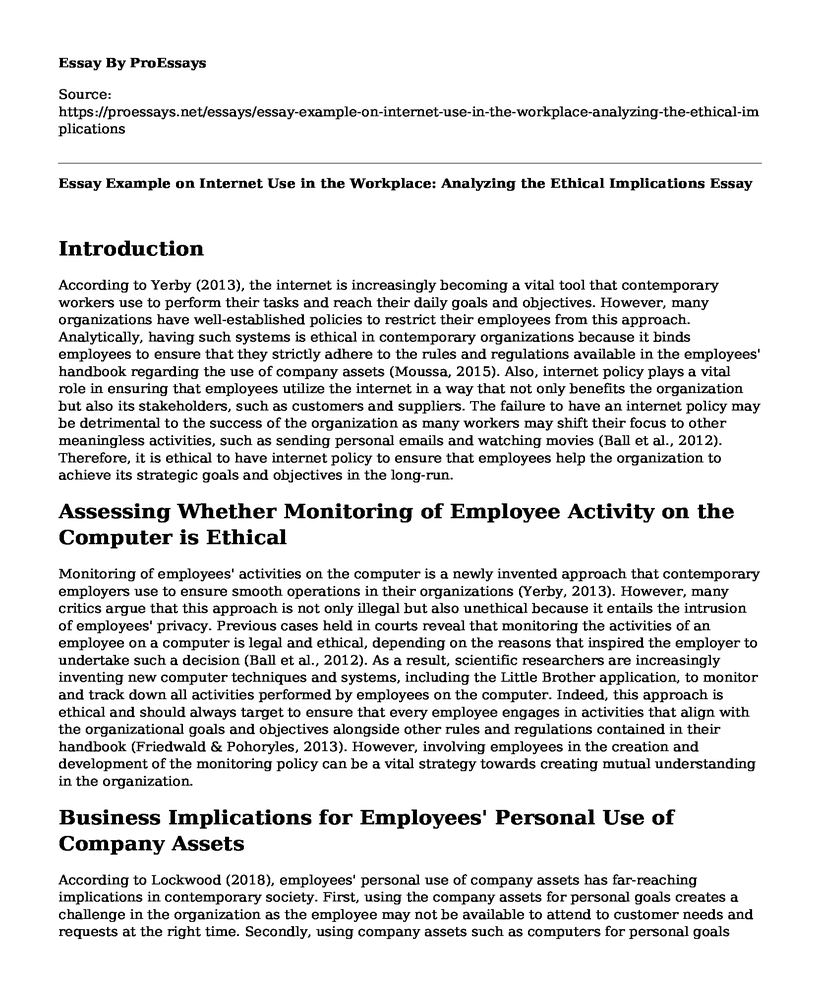Introduction
According to Yerby (2013), the internet is increasingly becoming a vital tool that contemporary workers use to perform their tasks and reach their daily goals and objectives. However, many organizations have well-established policies to restrict their employees from this approach. Analytically, having such systems is ethical in contemporary organizations because it binds employees to ensure that they strictly adhere to the rules and regulations available in the employees' handbook regarding the use of company assets (Moussa, 2015). Also, internet policy plays a vital role in ensuring that employees utilize the internet in a way that not only benefits the organization but also its stakeholders, such as customers and suppliers. The failure to have an internet policy may be detrimental to the success of the organization as many workers may shift their focus to other meaningless activities, such as sending personal emails and watching movies (Ball et al., 2012). Therefore, it is ethical to have internet policy to ensure that employees help the organization to achieve its strategic goals and objectives in the long-run.
Assessing Whether Monitoring of Employee Activity on the Computer is Ethical
Monitoring of employees' activities on the computer is a newly invented approach that contemporary employers use to ensure smooth operations in their organizations (Yerby, 2013). However, many critics argue that this approach is not only illegal but also unethical because it entails the intrusion of employees' privacy. Previous cases held in courts reveal that monitoring the activities of an employee on a computer is legal and ethical, depending on the reasons that inspired the employer to undertake such a decision (Ball et al., 2012). As a result, scientific researchers are increasingly inventing new computer techniques and systems, including the Little Brother application, to monitor and track down all activities performed by employees on the computer. Indeed, this approach is ethical and should always target to ensure that every employee engages in activities that align with the organizational goals and objectives alongside other rules and regulations contained in their handbook (Friedwald & Pohoryles, 2013). However, involving employees in the creation and development of the monitoring policy can be a vital strategy towards creating mutual understanding in the organization.
Business Implications for Employees' Personal Use of Company Assets
According to Lockwood (2018), employees' personal use of company assets has far-reaching implications in contemporary society. First, using the company assets for personal goals creates a challenge in the organization as the employee may not be available to attend to customer needs and requests at the right time. Secondly, using company assets such as computers for personal goals denies other employees the opportunity to have access to such assets, which are critical in ensuring that every process runs smoothly (Friedwald & Pohoryles, 2013). Thirdly, employees who use company assets for personal interests can lead to delayed delivery of services as well as goods to the desired destinations, which, in turn, culminates in low levels of customer satisfaction. Failing to satisfy customers can also lead to a damaged organizational reputation. Lastly, employees' personal use of company assets may culminate in financial losses and the imminent closure of the business due to low productivity (Moussa, 2015). Therefore, employees must ensure that they use company assets to meet organizational goals and not to satisfy their interests.
Approach to Take to Address the Identified Issue with the Jewelry Company
According to Lockwood (2018), a typical jewelry company may face various challenges, including the issue of monitoring employees' activities on the computer. There are multiple strategies that the organization can implement to ensure that it successfully handless such problems. First, the company should develop an internet policy to exercise control over employees' use of the internet (Yerby, 2013). However, the success of this policy will depend on the ability of the jewelry company management to engage its employees to provide appropriate suggestions to consider when developing and implementing it. Secondly, the organization should have an agreement with the employees regarding the issue of monitoring their activities on the computer as well as the internet to ensure that they gain a mutual understanding (Moussa, 2015). Lastly, the company can introduce warnings and fines for employees who violate the policy.
References
Ball, K., Daniel, E. M., & Stride, C. (2012). Dimensions of employee privacy: An empirical study. Information Technology & People, 25(4), 1-34. https://oro.open.ac.uk/34046/2/B1727E4C.pdf.
Friedwald, M. & Pohoryles, R. J. (2013). Technology and privacy. Innovation: The European Journal of Social and Science Research, 26(1-2), 1-6. https://www.tandfonline.com/doi/full/10.1080/13511610.2013.768011.
Lockwood, G. (2018). Workplace monitoring and surveillance: The British context. Athens Journal of Law, 4(3), 205-228. https://www.athensjournals.gr/law/2018-4-3-1-Lockwood.pdf.
Moussa, M. (2015). Monitoring employee behavior through the use of technology and issues of employee privacy in America. Sage Open, 1(2), 1-3. https://journals.sagepub.com/doi/pdf/10.1177/2158244015580168.
Yerby, J. (2013). Legal and ethical issues of employee monitoring. Online Journal of Applied Knowledge Management, 1(2), 44-55. https://pdfs.semanticscholar.org/be8a/e72e847d650683d4b3e8e236674bf7f86dbb.pdf.
Cite this page
Essay Example on Internet Use in the Workplace: Analyzing the Ethical Implications. (2023, Apr 09). Retrieved from https://proessays.net/essays/essay-example-on-internet-use-in-the-workplace-analyzing-the-ethical-implications
If you are the original author of this essay and no longer wish to have it published on the ProEssays website, please click below to request its removal:
- Essay Sample on Unhealthy Relationship at the Workplace
- Farm to Table Restaurants Essay
- Application for BSc (Finance and Accounting Management) Paper Example
- Implications of Employee Recruiting to Nursing Leaders Paper Example
- How Was Training Adoption Measured in Allianz Company? Paper Example
- Essay Example: Is Food Coloring Safe for Kids?
- Non-Profit Employees in Savannah: The Impact of Motivation on Job Satisfaction - Paper Sample







